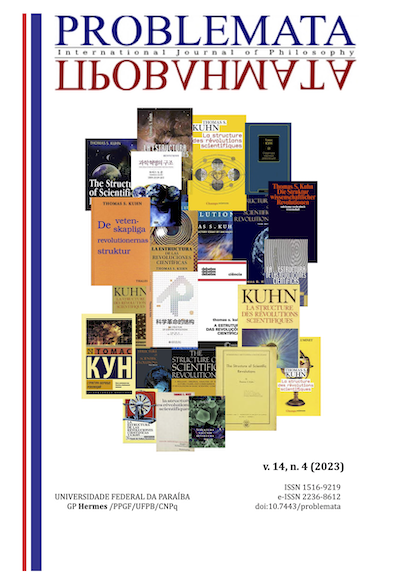RATIONALITY AND RELATIVISM IN STRUCTURE?
DOI:
https://doi.org/10.7443/problemata.v14i4.66827Keywords:
scientific rationality, epistemological relativism, incommensurability, Thomas Kuhn, Gerald DoppeltAbstract
This paper examines Gerald Doppelt’s relativistic interpretation of the conception of scientific rationality in Thomas Kuhn’s The structure of scientific revolutions. I show that his reading implies that, in a dispute for paradigm, judgments of cognitive superiority are relative to views of science. I defend that this kind of relativism precludes any explanation of individual revolutionary changes from previous research guidelines to a new one based on epistemic reasons. I also argue that it does not capture phases of the revolutionary period. Finally, considering aspects of the phlogiston-oxygen controversy, I show that the epistemological incommensurability in the revolutionary period is not between paradigms that guided the scientific community in successive periods of normal science. Alternatively, I indicate that Kuhn's pronouncements can be construed from a pragmatist point of view to how scientists are not prisoners of their research commitments and relativistic situations in scientific controversies are transient.
Downloads
References
BARNES, Barry. Kuhn and social science. New York: Columbia University Press, 1982.
BEST, Nicholas W. Lavoisier’s “Reflections on phlogiston” I: against phlogiston theory. Foundations of Chemistry, v. 17, p. 137–151, 2015. DOI: https://doi.org/10.1007/s10698-015-9220-5
BIRD, Alexander. Thomas Kuhn’s relativistic legacy. In: HALES, Steven D. A companion to relativism. Oxford: Blackwell Publishing, 2011, p. 475-488.
BLUMENTHAL, Geoffrey; LADYMAN, James. The development of problems within the phlogiston theories, 1766-1791. Foundations of Chemistry, v. 19, p. 241-280, 2017. DOI: https://doi.org/10.1007/s10698-017-9289-0
DAUMAS, Maurice; DUVEEN, Denis. Lavoisier's relatively unknown large-scale decomposition and synthesis of water, february 27 and 28, 1785. Chymia, v. 5, p. 113-129, 1959.
DOPPELT, Gerald. Kuhn’s epistemological relativism: an interpretation and defense. Inquiry, v. 21, p. 33-86, 1978.
GUITARRARI, Robinson; PLASTINO, Caetano Ernesto. Dimensões da incomensurabilidade. Ideação, v. 1, p. 31-62, 2014.
GUITARRARI, Robinson. O relativismo é autorrefutante? Transformação, v. 39, p. 139-158, 2016.
HEMPEL, Carl Gustav. Studies in the Logic of Confirmation. Mind, v. 54, p. 1-26, p. 97–121, 1945.
HOYNINGEN-HUENE, Paul. Reconstructing scientific revolutions: Thomas Kuhn’s Philosophy of Science. Chicago: The University Chicago Press, 1993.
KITCHER, Philip. The advancement of science: science without legend, objectivity without illusions. Oxford: Clarendon Press, 1993.
KITCHER, Philip. Patterns of scientific controversies. In: MACHAMER, P.; PERA, M.; BALTAS, A. (ed.). Scientific controversies: philosophical and historical perspectives. New York: Oxford University Press, 2000. p. 21-39.
KITCHER, Philip. Science, truth, and democracy. New York: Oxford University Press, 2001.
KITCHER, Philip. The many lessons of Structure. Historical Studies in the Natural Sciences, v. 42, n. 5, p. 532-537, 2012.
KUHN, Thomas Samuel. The structure of scientific revolutions. 2. ed. Chicago: Chicago University Press, 1970.
KUHN, Thomas Samuel Objectivity, value judgment, and theory choice. In: KUHN, Thomas S. The essential tension. Chicago: University of Chicago Press, 1977. p. 320-339.
KUHN, Thomas Samuel. Commensurability, comparability, communicability. In: KUHN, Thomas S. The road since Structure. Chicago/London: University of Chicago Press, 2000. p. 32-57.
LAKATOS, Imre. Falsification and the methodology of scientific research programmes. In: LAKATOS, Imre; MUSGRAVE, Alan (ed.). Criticism and the growth of knowledge: Proceedings of the International Colloquium in the Philosophy of Science, London, 1965. Cambridge: Cambridge University Press, 1970. p. 91-196.
LAUDAN, Larry. Science and values. Berkeley, Los Angeles, London: University of California Press, 1984.
LAUDAN, Larry. For method: answering the relativist critique of methodology of Kuhn and Feyerabend. In: LAUDAN, Larry. Beyond positivism and relativism: theory, method, and evidence. Colorado: Westview Press, 1996. p. 88-112.
LAUDAN, Larry; LAUDAN, Rachel. Dominance and the disunity of method: solving the problems of innovation and consensus. Philosophy of Science, v. 56, p. 221-237, 1989.
POPPER, Karl Raimund. The logic of scientific discovery. London: Hutchinson, 1959.
POPPER, Karl Raimund. Normal science and its dangers. In: LAKATOS, Imre; MUSGRAVE, Alan. (ed.). Criticism and the growth of knowledge: Proceedings of the International Colloquium in the Philosophy of Science, London, 1965. Cambridge: Cambridge University Press, 1970. p. 51-58.
PUTNAM, Hilary. Reason, truth, and history. Cambridge: Cambridge University Press, 1981.
SCHEFFLER, Israel. Science and Subjectivity. Indianapolis: Bobbs-Merrill, 1967.
SHAPERE, Dudley. Meaning and Scientific Change. In: COLODNY, Robert G. (ed.). Mind and Cosmos: Essays in Contemporary Science and Philosophy. Pittsburgh: University of Pittsburgh Press, 1966. p. 41-85.
Downloads
Published
Issue
Section
License
Copyright (c) 2023 Robinson Guitarrari

This work is licensed under a Creative Commons Attribution 4.0 International License.
Authors who publish with this journal agree to the following terms:
- Authors retain copyright and grant the journal right of first publication with the work simultaneously licensed under a Creative Commons Attribution License that allows others to share the work with an acknowledgement of the work's authorship and initial publication in this journal.
- Authors are able to enter into separate, additional contractual arrangements for the non-exclusive distribution of the journal's published version of the work (e.g., post it to an institutional repository or publish it in a book), with an acknowledgement of its initial publication in this journal.
-
- Authors are permitted and encouraged to post their work online (e.g., in institutional repositories or on their website) prior to and during the submission process, as it can lead to productive exchanges, as well as earlier and greater citation of published work (See The Effect of Open Access).





